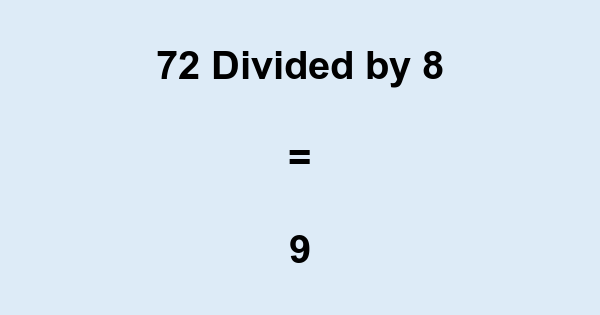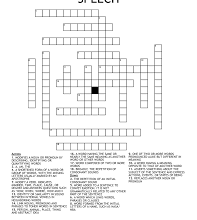Look out for 72 divided by 8

The 72 divided by 8 internet has a way of captivating us with its endless supply of memes, viral videos, and debates that seem to go on forever. But there’s one mathematical error that has taken the online world by storm, dividing opinions like never before. It’s a simple equation: 72 divided by 8. Seems straightforward enough, right? Well, buckle up because this seemingly innocent calculation has sparked heated arguments and confusion all across cyberspace. In this blog post, we’ll delve into the origin of this divisive error and explore why some people still swear by it. So grab your calculators and get ready to uncover the truth behind 72 divided by 8!
The mathematical error that’s been dividing the internet
It all started innocently enough. Someone, somewhere, posed the question: “What is 72 divided by 8?” Seems like a simple arithmetic problem that should have an undisputed answer, right? Well, little did we know that this seemingly elementary calculation would ignite a fierce debate across social media platforms and online forums.
The confusion stems from the fact that some individuals firmly believe the answer to be 9, while others adamantly argue for a different solution altogether. How can something so straightforward cause such uproar? Well, it all boils down to how people interpret and apply mathematical principles.
Those who support the idea of 72 divided by 8 equaling 9 do so based on their understanding of multiplication as repeated addition. They see it as eight groups of nine making up a total of seventy-two. On the surface, this reasoning seems logical and compelling.
However, mathematics tells us otherwise. When we perform division calculations using standard algorithms or techniques taught in schools worldwide, we discover that dividing seventy-two by eight yields an entirely different result: nine point zero! This decimal representation indicates that there are no remaining shares or fractional parts when dividing equally among eight entities.
So why does this discrepancy persist? Perhaps it’s due to personal preferences or varying levels of mathematical education and understanding. It could also be attributed to misinformation spread across online channels without proper verification or critical analysis.
Whatever the reasons may be, one thing is certain – this mathematical error has become a source of endless fascination and frustration for netizens everywhere. So next time you stumble upon someone claiming that 72 divided by 8 equals anything other than nine point zero (or simply put – just plain old nine), take it with a grain of salt and remember the fundamental principles guiding our numerical world.
How the error originated
The origin of the mathematical error that has been dividing the internet is shrouded in mystery. It’s difficult to pinpoint exactly when or how it started, but one theory suggests that it may have originated from a misinterpretation or misunderstanding of basic math principles.
Perhaps someone made a simple mistake while performing the division and others followed suit without double-checking their calculations. Or maybe there was a typo in an educational resource that perpetuated the incorrect answer.
Another possibility is that people simply fell victim to misinformation spread through social media and other online platforms. With so much information readily available at our fingertips, it’s easy for false claims to gain traction and go viral.
Regardless of how this error originated, what’s important now is setting the record straight and educating ourselves on proper mathematical principles. Let’s delve into why some individuals still insist that 72 divided by 8 equals 9, despite evidence to the contrary.
Why some people insist 72 divided by 8 is correct
It’s a mathematical error that has perplexed and divided the internet: 72 divided by 8. While the correct answer is undeniably 9, there are still some who insist that it is actually 8. But why do they hold on to this incorrect belief?
One reason could be confusion stemming from the order of operations in mathematics. Some individuals may mistakenly think that when dividing, you should always round down. Therefore, they argue that if you divide 72 by 8, the result would be rounded down to 8.
Another possible explanation for this misconception is a misunderstanding of basic arithmetic principles. Some people might believe that any number divided by itself equals one, regardless of what numbers are involved. In this case, since both 72 and 8 can be evenly divided by two (36 and 4 respectively), those who subscribe to this misconception may erroneously conclude that dividing them results in one.
Additionally, cognitive biases such as confirmation bias can contribute to stubbornly holding onto an incorrect belief despite overwhelming evidence against it. Once someone forms an initial opinion or belief about something, their mind tends to seek out information or interpretations that support their preconceived notion while ignoring contradictory evidence.
So even though the math clearly shows us that correctly dividing 72 by 8 yields a quotient of nine, some individuals persistently cling to the erroneous idea that it equals eight. This serves as a reminder of how our perceptions and beliefs can sometimes lead us astray when faced with simple mathematical calculations.
To avoid falling into similar traps ourselves, let us remember to approach these types of problems with an open mind and rely on accurate mathematical principles rather than personal biases or misconceptions. Mathematics provides us with solid rules and guidelines we can trust – all we need to do is follow them correctly!
The math behind why 72 divided by 8 is wrong
Have you ever come across a mathematical problem that seems so simple, yet has caused confusion and debate among people? Look no further than the equation 72 divided by 8. While some insist that the answer is 9, the truth is that they have fallen victim to a common misconception.
The error lies in misunderstanding the order of operations in mathematics. According to PEMDAS (Parentheses, Exponents, Multiplication and Division from left to right, Addition and Subtraction from left to right), multiplication and division should be done before addition and subtraction. In this case, we must first divide 72 by 8 before adding anything else.
When we divide 72 by 8, we get an answer of 9. However, those who erroneously believe it equals something different often make the mistake of adding another number or operation at this point. They might add or subtract numbers without realizing that multiplication and division take precedence over these operations.
To avoid falling into this trap yourself or encountering others who do so, always remember PEMDAS when solving equations. By following this order of operations faithfully, you can ensure accurate results every time.
Understanding the math behind why dividing 72 by 8 yields an answer of 9 is crucial for clear thinking and logical reasoning in various areas of life. So next time someone tries to tell you otherwise or struggles with basic arithmetic principles themselves – don’t fall into their misguided beliefs!
How to avoid making the same mistake
How to avoid making the same mistake
Now that we’ve uncovered the truth about 72 divided by 8, it’s important to learn from this mathematical error and ensure we don’t fall into the same trap in the future. Here are a few tips on how to avoid making the same mistake:
1. Double-check your calculations: It’s always a good practice to double-check your math before accepting it as correct. Take a moment to review your work and make sure you haven’t made any errors along the way.
2. Use parentheses when needed: When dealing with complex equations or multiple operations, be sure to use parentheses correctly. This will help clarify which calculations should be done first and prevent confusion.
3. Seek clarification if uncertain: If you come across a calculation that seems off or contradictory, don’t hesitate to seek clarification from others who may have more expertise in mathematics. Sometimes an extra pair of eyes can spot an error that you might have missed.
4. Stay open-minded: It’s easy for misconceptions and false information to spread on the internet, so it’s crucial to approach new concepts with an open mind but also a healthy skepticism. Don’t blindly accept something just because it seems logical or is widely believed.
5. Continuously learn and improve: Mathematics is all about learning from mistakes and growing our understanding of numbers and logic. Embrace opportunities for learning, whether through formal education or online resources, so you can continue sharpening your mathematical skills.
By following these simple guidelines, we can steer clear of perpetuating mathematical errors like the infamous 72 divided by 8 misconception in our own computations and discussions online.
Remember, math isn’t just about getting answers right; it’s also about developing critical thinking skills and avoiding common pitfalls along the way! So let’s keep exploring numbers with curiosity and precision while being mindful of potential pitfalls that could lead us astray.




